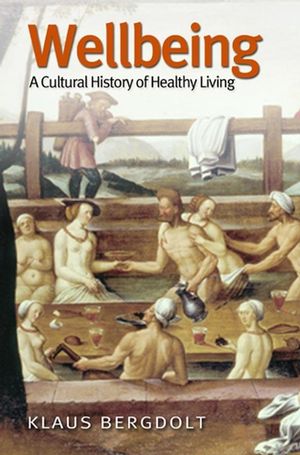Wellbeing: A Cultural History of Healthy LivingISBN: 978-0-7456-2914-8
Paperback
416 pages
May 2008, Polity
 Other Available Formats: Hardcover
|
||||||
Introduction 1
Prologue: The Ancient Advanced Civilizations – Egypt, Mesopotamia, Persia 7
1 Greece 14
The ideal of health in ancient Greece 14
The Presocratics 19
The Hippocratic corpus 24
Diocles of Carystus, a fourth-century health pedagogue 30
‘Knidic’ dietetics 33
Health in Plato and Aristotle 37
Dietetics in Alexandria 44
Cures and miracles, Aesculapius and Hygieia 46
Public health care and sport 53
Early Stoics and Cynics 56
2 Rome 62
People and literati: dietetics in ancient Rome 62
New doctors, new theories 73
Sport and baths 77
The sacred tales of Publius Aelius Aristides 79
The Roman Stoics: Plutarch, Seneca, Marcus Aurelius, Epictetus 82
Galen 87
3 Jewish and Early Christian Traditions 94
Jewish doctrines of health 94
Christus medicus 98
Early Christian doctrines of health 103
4 Medieval Traditions in the East and West 109
Jealing and health in early monasticism 109
The first German pharmacopoeia 113
Dietetics in Islam 116
Medieval doctrines of health in the West 124
Asceticism and mysticism – feasts and beauty care 131
Western and Eastern clerical scholars: Maimonides, Petrus, Hispanus, Roger Bacon 137
Hildegard of Bingen 146
Saints and miracle workers 149
The power of the stars 154
5 Doctrines of Health in the Renaissance 158
Petrarch’s conception of health 158
Alberti and other intellectuals around 1500 161
House books and manuals – health and literature 168
Further humanists – Platina, More, Luther 173
Philosophy of health and prophylaxis in Venice – Mercuriale, Rangone, Cornaro 179
Gabriele Zerbi and the Gerontocomia 185
Paracelsus’ teachings on health 187
Herbal books 191
Dietetics in daily life 194
6 Dietetics in the Seventeenth Century 199
Cartesianism and conservative tendencies 199
Van Helmont, Sylvius and other ‘iatrochemists’ 208
Doctrines of health in England – the dietetics of the state 210
Health through planning – the utopias 216
The dietetics of the Enlightenment – philosophers, pedagogues, charlatans 220
7 Doctrines of Health in the Eighteenth Century 226
Medical theories of health 226
The French Enlightenment and Rousseau 233
Tissot, Triller, Mai: health education at grassroots 239
Public health care 247
8 Around 1800 251
The notion of ‘Lebenskraft’ (vital force) – Hufeland and Kant 251
The recurrent topic of a dietetic regime for intellectuals 255
Alternative paths to health 258
Goethe 263
Romantic medicine – Schelling, Carus, Novalis 266
9 The Nineteenth Century 274
Trends in the nineteenth century 274
Rudolf Virchow and the dietetics of reason 276
Nietzsche, Schopenhauer and the philosophical critique of positivism 280
The revolution in nutrition and alternative paths to health 283
Afterword 287
Notes 289
References 327
Index 348



